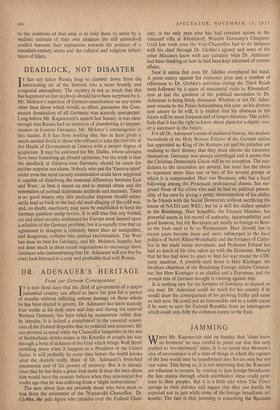DR. ADENAUER'S HERITAGE
From our German Correspondent 'T is rare these days that the chief of government of a major industrial country can afford to leave his post for a period of months without inflicting serious damage on those whom he has been elected to govern. Dr. Adenauer has spent scarcely four weeks at his desk since mid-July and during the interval Western Germany has been ruled by momentum rather than by impulse. It is indeed a compliment to the essential sound- ness of the Federal Republic that its political and economic life can proceed as usual while the Chancellor languishes in the stin of Switzerland, drinks toasts in the Kremlin or coughs his way through a bout of sickness of the kind which brings Wall Street tumbling down when it happens to a President of the United States. It will probably be some time before the world knows what the doctors really think of Dr. Adenauer's bronchial pneumonia and of his powers of recovery. But it is already clear that he has been a great deal more ill than the men about him would have the country believe when they announced five weeks ago that he was suffering from a 'slight indisposition.'
The men about him are precisely those who have most to lose £rom the retirement of the 79-year-old Chancellor. Dr. Globkc, the pale figure who presides over the Federal Chan- eery. is the only man who has had constant access to the vineyard villa at Rhoendorf, Western Germany's Chequers. Until last week even the Vice-Chancellor had to do business with his chief through Dr. Globke's agency and none of the other Ministers knew with any certainty what Dr. Adenauer had been thinking or how he had been kept informed of current affairs.
Now it seems that even Dr. Globke overplayed his hand. A press outcry against the eminence grise and a number of references to Dr. Globke's activities during the Third Reich were followed by a spate of ministerial visits to Rhoendorf; now at last the question of the political succession to Dr. Adenauer is being freely discussed. Whether or not Dr. Aden- auer returns to the Palais Schaumburg this year, as his doctors now assure us he will, it is evident that his absences in the future will be more frequent and of longer duration. The public feels that it has the right to know about plans for a deputy now or a successor in the future.
For all Dr. Adenauer's sense of medieval history, the modern incumbent of the Holy Roman Empire of the German nation has appointed no King of the Romans yet and his paladins are realising to their dismay that they must choose his successor themselves. Germany was always centrifugal and it seems that the Christian Democratic Union will be no exception. The can- didates to the succession are several, but none has the claim to represent more than one or two of the several groups of which it is compounded. Herr von Brentano, who has a loyal following among the Protestant professional classes, has sur- prised those of his critics who said he had no political person- ality of his own by giving a pretty demonstration of his ability to be friends with the Social Democrats without sacrificing the tenets of NATO and WEU; but he is still the dullest speaker in the Bundestag. Herr Schaeffer, the Finance Minister, has powerful assets in his record of authority, incorruptibility and good humour, but the Bavarians are nearly as foreign to Bonn as the Irish used to be to Westminster. Herr Arnold has in recent years become more and more submerged in the local politics of North Rhine-Westphalia and the fortunes of Catho- lics in the trade union movement, and Professor Erhard has had so much of his time taken up with the Economic Miracle that he has had none to spare to find his way round the CDU party machine. A possible dark horse is Herr Kiesinger. the Swabian chairman of the Bundestag Foreign Affairs Commit- tee; but Herr Kiesinger is an idealist and a European, and the present tide of German thought is running against him.
It is nothing new for the fortunes of Germany to depend on one man. Dr. Adenauer could do much for his country if he would draw the consequences of his growing frailty and name an heir now. He could put an honourable end to a noble career if he were to save the Federal Republic from an interregnum which could only help the common enemy in the East.


































 Previous page
Previous page